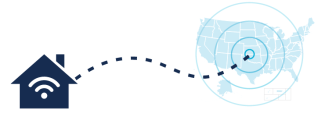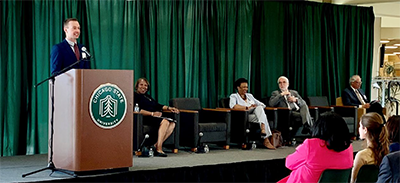Broadband Grant Programs
Envisioning an Equitable, Inclusive Connected America
Broadband Equity, Access, and Deployment Program
The BEAD Program provides $42.45 billion to expand access to affordable, reliable, high-speed Internet by funding planning, infrastructure deployment and adoption programs in all 50 states, Washington D.C., Puerto Rico, and the additional U.S. territories. It prioritizes funding for connecting unserved locations, specifically those that have no Internet access, lack reliable broadband service, or access to speeds under 25/3 Megabits per second (Mbps), and underserved locations that only have access to speeds between 25/3 and under 100/20 Mbps. In June of 2023, NTIA announced allocations for all 56 states and territories. Program rules required states and territories to submit Initial Proposals describing how they propose to engage with their communities and subgrant funds to address the unserved and underserved locations by December 27, 2023. All 56 Eligible Entities met this deadline, and their proposals will be reviewed for approval through 2024. The program’s rules required that each state and territory include plans for a BEAD “state challenge process” in their Initial Proposal. In the challenge process, a unit of local government (including Tribal governments), nonprofit organizations, or Internet Service Providers may challenge whether a location or community anchor institution is eligible for BEAD funding, including whether a location has limited (underserved) or no qualifying Internet service (unserved).

On November 1, 2023, NTIA released a programmatic waiver that modifies the requirement of an irrevocable standby Letter of Credit (LOC). This waiver promotes inclusivity by encouraging competition among Internet service providers of all sizes and allows credit unions to issue LOCs, permits the use of performance bonds as an alternative to LOCs, and provides flexibility in reducing the LOC requirement over time to address concerns and promote broader participation in the BEAD program.
Digital Equity Act Program
The Digital Equity Act of 2021 established three grant programs, totaling $2.75 billion. These programs focus on providing the skills, technology, and capacity needed for all people and communities to reap the benefits of the digital economy.
The State Digital Equity Planning Grant is a $60 million formula grant program for recipients to develop Digital Equity plans. Of the eligible state and territory Digital Equity applicants that submitted applications for Digital Equity planning funds, 56 grants have been awarded totaling approximately $54 million.
The State Digital Equity Capacity Grant Program is a $1.44 billion formula grant program for states, territories, and Native Entities. It will fund an annual grant program for Fiscal Years 2022 through 2026 in support of Digital Equity projects and the implementation of State and Territory Digital Equity Plans. NTIA will allocate funds for states and territories based on the formula provided in the Digital Equity Act. Awardees will use these funds to implement the plans developed through the State Digital Equity Planning Grant Program. Grant awards to Native Entities will be awarded on a competitive basis under criteria outlined in the forthcoming Capacity Notice of Funding Opportunity (NOFO). OICG will release the NOFO for the Digital Equity Capacity Grant in March 2024.
The Digital Equity Competitive Grant Program is a $1.25 billion grant program that will fund annual grant programs in Fiscal Years 2022 through 2026. This program will develop and implement digital inclusion activities and Digital Equity projects. The program will be open to certain entities, such as political subdivisions of states, Native Entities, nonprofits, community anchor institutions, local educational agencies and workforce development organizations. OICG expects to release the NOFO for the Digital Equity Competitive Grants in 2024, after the first State Digital Equity Capacity Grant is awarded.
Enabling Middle Mile Broadband Infrastructure
The Middle Mile Program provided nearly $1 billion to expand middle mile Internet infrastructure and reduce the cost of connecting unserved and underserved areas. NTIA received over 235 applications totaling over $5.5 billion in funding requests during the application window. The Middle Mile program is key to increasing the resilience of Internet infrastructure in the United States by promoting the creation of alternate network connection paths designed to prevent single point broadband network failures. All projects use future proof fiber as the primary technology.
In 2023, OICG awarded $980 million to expand middle mile high-speed Internet infrastructure covering more than 370 counties across 40 states and Puerto Rico. These projects will deploy more than 12,500 miles of new fiber that will pass within 1,000 feet of 7,125 community anchor institutions.
Tribal Broadband Connectivity Program
The TBCP is a $3 billion grant program dedicated to Tribal governments to be used for broadband deployment on Tribal lands, as well as for use and adoption activities such as expanding and increasing telehealth, distance learning, broadband affordability, and digital inclusion. The TBCP was created by the CAA as a $1 billion program. In the initial application window, OICG received over 300 applications requesting over $5 billion from the Tribal Broadband Connectivity Program. In recognition of the overwhelming need shown by TBCP applications, the BIL provided $2 billion in additional funding.8 As of 2023, OICG has awarded more than $1.86 billion to 226 Tribal entities. Construction on these projects is ongoing and expected to connect approximately 140,000 unserved Native households and 1,000 Native community anchor institutions. Use and adoption projects are also ongoing and have distributed more than 4,000 digital devices and pre-paid broadband services for more than 5,000 Tribal homes.
OICG also announced the second TBCP NOFO in July 2023 to distribute the remaining approximately $980 million in funding. In this second NOFO, NTIA will award funding for broadband infrastructure deployment projects on Tribal Lands, targeting projects between $1 million and $50 million and Internet adoption projects between $100,000 to $2.5 million. Over the course of 2023, the TBCP team focused on preparing and supporting eligible Tribal entities for the second round of grant applications. The application window for the second NOFO will close in March 2024. NTIA anticipates announcing awards beginning in 2024. The TBCP FPO’s also provided post-award oversight and Technical Assistance to its 226 awardees to support their compliance with federal award conditions, project success and to monitor for waste, fraud and abuse of federal funds.
Broadband Infrastructure Program

The Broadband Infrastructure Program (BIP) is a $300 million program to support infrastructure deployment in areas lacking broadband, especially rural areas. The application window for this program closed August 17, 2021, with more than 275 applications submitted requesting over $2.8 billion in grants. BIP granted 14 awards in 2022, totaling over $282 million.9 The 14 awards allocated all grant funds appropriated for the program. BIP recipients partnered with 38 different service providers to execute their projects. Construction on these projects is ongoing and expected to connect more than 140,000 unserved households, 6,700 businesses, and 585 community anchor institutions by deploying over 4,500 new miles of fiber across 13 states and one territory. By the end of 2023, BIP infrastructure deployment made service available to more than 33,500 households. The BIP FPOs also provided post-award oversight and Technical Assistance to its awardees to support their compliance with federal award conditions, project success, and to monitor for waste, fraud and abuse of federal funds.
The Office of Minority Broadband Initiatives and the Connecting Minority Communities (CMC) Pilot Program
NTIA established the Office of Minority Broadband Initiatives (OMBI) within OICG, as directed by the CAA. Through OMBI, NTIA directly addresses the lack of broadband access, connectivity, adoption and equity among Historically Black Colleges and Universities (HBCUs), Hispanic Serving Institutions (HSIs), Tribal Colleges and Universities (TCUs) and Minority Serving Institutions (MSIs), and in their surrounding anchor communities in the United States. To make this happen, OMBI collaborates with federal agencies that carry out broadband Internet access service support programs; state, local and Tribal governments; and stakeholders in the communications, education, business, and technology fields.
OMBI oversees the administration of the Connecting Minority Communities (CMC) Pilot Program. CMC is a $285 million grant program for HBCUs, HSIs, TCUs, and MSIs to purchase broadband Internet service and eligible equipment, and to hire and train information technology (IT) personnel. During the application window, which closed December 1, 2021, NTIA received more than 200 applications requesting over $833 million in funding for the CMC Pilot Program. In 2023, CMC awarded more than $262 million to 74 colleges and universities in 30 states and four territories.10 With these grants, NTIA awarded all available funding from the CMC Pilot Program. OICG ensured the final allocation of grant funds, satisfied the statutory requirement to distribute at least 40 percent of funds to qualifying HBCUs, with at least 20 percent of funds distributed to applicants that provide high-speed Internet access service and/or eligible equipment to their students. In total, CMC awarded funds to 93 colleges and universities, including 43 HBCUs, 31 HSIs, 21 MSIs, and 5 TCUs.11 Through CMC funding, over 37,000 computers and 18,000 hotspots were distributed; 35,000 staff received professional training and over 200,000 received digital literacy and/or workforce training.
As a part of the CMC Pilot Program, OMBI launched the CMC Learning Network (CMC-LN) a forum where CMC awardees interact and collaborate on a regular basis to share ideas and discuss best practices as they work through their grant projects, as well as receive Technical Assistance from the CMC FPOs, and OICG’s Grants and Compliance Division. In 2023, OMBI held three webinars for the CMC-LN membership, educating attendees on procurement and tangible property management, environmental and historic preservation compliance and the Build America, Buy America Act. Additionally, OMBI facilitated five Meet and Share meetings in 2023, which provided grantees the opportunity to talk about their own projects, ask each other questions and participate in related discussions. The CMC FPOs also provided post-award oversight and Technical Assistance to its more than 90 awardees to support their compliance with federal award conditions, project success and to prevent waste, fraud and abuse of federal funds.
To learn more about OMBI and the CMC program see the forthcoming 2023 OMBI Annual Report which can be found on ntia.gov.
The Work of the OIGC: Foundations Laid (Part I)
8 Total appropriated funds may differ from total grant funding due to administrative set asides and budgetary rescissions.
9 Total appropriated funds may differ from total grant funding due to administrative set asides and budgetary rescissions.
10 Total appropriated funds may differ from total grant funding due to administrative set asides and budgetary rescissions.
11 This designation count reflects universities that hold multiple designations (e.g., TCU and MSI). This multiple designation is reflected in the individual designation count listed, the number of CMC recipients is 93.
